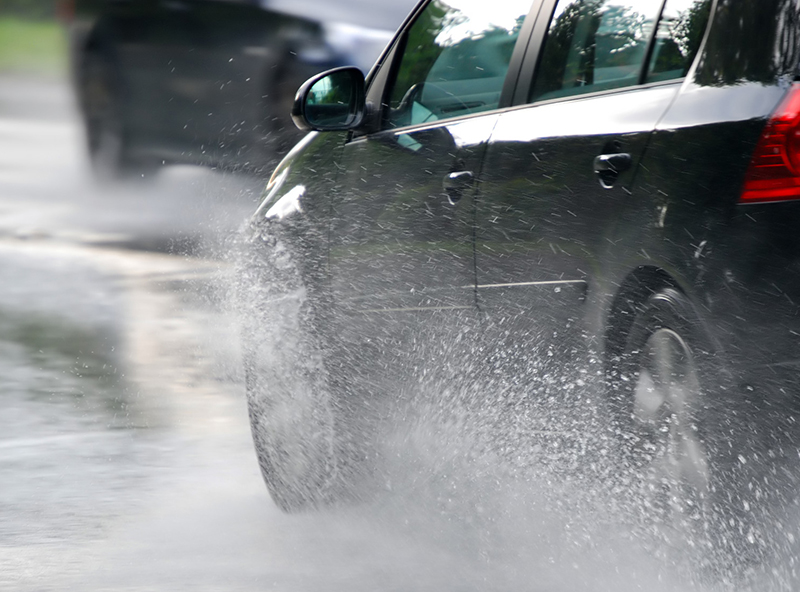Here are some important notes about your car and our West Coast Climate.
Tires:
West Coast generally might be referred to as “Wet Coast”. Our climate presents many days of heavy, torrential rain. In heavy rain water collects and pools on our roadways and highways creating a potential unsafe environment for your car. Provincial Government Safety Inspectors recommend properly inflated tires that measure not less than 4/32nds of an inch of tire tread depth. In our wet climate tires worn to less than 4/32nds of an inch are considered to have served their safe, useful life. Hydroplaning risk becomes very likely when driving on worn tires. Tire treads are designed to safely move standing water from under the tires path so your tires stay safely in contact with the pavement. Lack of tread increases the risk that your tires will float or skip on the surface of the water and lose contact with the pavement. We have all felt the uncomfortable sensation of your steering wheel pulling or the front end of your vehicle shifting when you drive through standing water. Be certain to have your tire tread depth measured at each service and your tires rotated every second service to ensure safe and even tire wear.
Brakes:
Do braking systems wear and respond the same way in all climates? Absolutely not! Time and time again we see vehicle braking systems that are not adequately maintained. Again, our very wet,mild, mucky and winter-slushy climate requires that regular scheduled brake maintenance be performed to ensure safe braking function and extend the life of your very expensive braking components. The last time you had brake repair or replacement work done on your car, did your technician or shop owner recommend that going forward you invest annually in regularly scheduled brake maintenance? If the answer is no, you have been done a grave disservice. Your vehicles braking system is the single most important safety related system on your car. Once in motion, your car needs to stop within a safe distance. Our wet weather climate wreaks havoc on brake parts. New brake parts begin to see effects of corrosion within 1 week in our climate. Brake rotors, pads, calipers and drums are all manufactured from iron. Iron is highly subject to the effects of corrosion, especially in a wet and mild climate like ours. Rotors will become pitted with rust, brake caliper pistons and slide pins collect brake dust and road grime and the pads or friction material become saturated with water in wet weather driving. All of these components require cleaning, lubricating and adjusting on a regular basis. Investing once a year in your braking system can assist in extending the life of your brake parts but more importantly ensure that your braking systems performs safely when called upon.
Windshield Wipers:
Yes, the wet theme continues. How recently were your windshield wipers replaced? Depending on use and exposure to the suns UV rays and our harsh environment, experts recommend replacing your windshield wipers every 6-12 months. Think about it. A good quality set of all season windshield wiper blades will cost you about $30 – $40 installed. If you replace your wiper blades every six months, your daily investment is only sixteen to twenty-two cents a day. Surely your ability to see clearly in heavy rain or in glaring lights at night is worth at least that much. Our roadways collect oil and grime from tires and engine fluid leaks. In wet weather, this oil and grime is sprayed onto your windshield from the car ahead. Your wipers become contaminated with this grime and it affects their ability to properly clean your windshield glass. Suns UV rays and fallout from the atmosphere will also damage the pliability of the rubber on your blades. The wiper condition test is quite simple. Squirt washer fluid on your windshield and turn your wipers on. If you do not have a clear, streak free view following the second wiper swipe, it is time for new windshield wipers. Make a mental note before your next maintenance visit and ask that your windshield wipers be replaced to promote safety.

